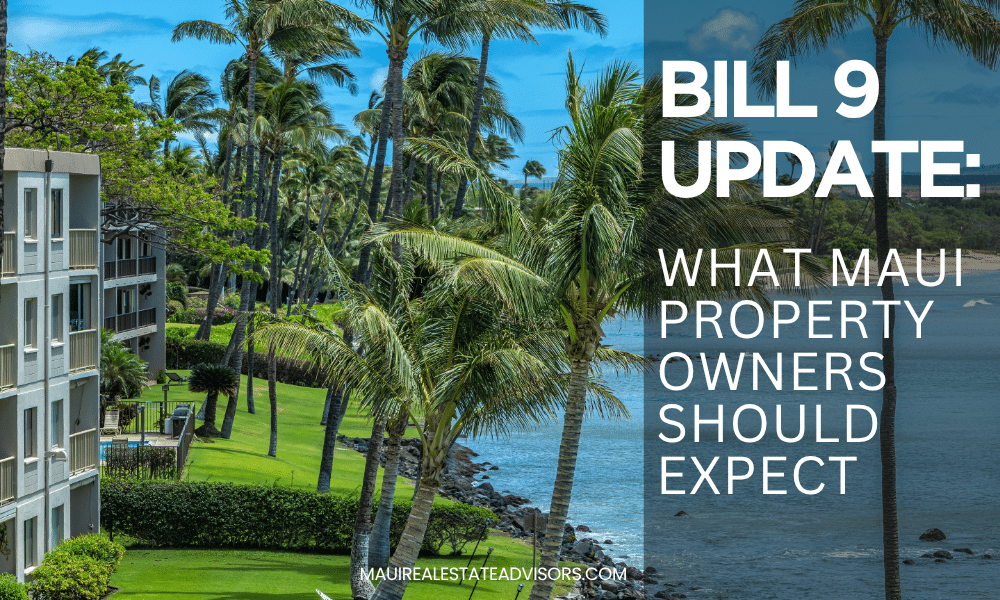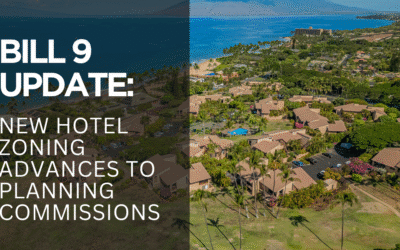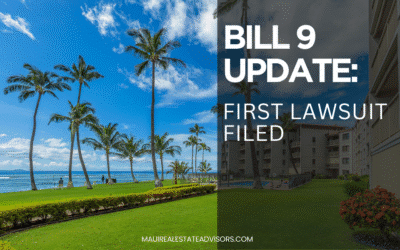Updated: September 16, 2025
December 15, 2025 Update: Bill 9 Passed its second reading, please read the details here.
October 14, 2025 UPDATE: Maui’s latest proposal introduces new hotel zones that could protect select vacation-rental condos. Learn which properties are included and what it means for owners.
After months of uncertainty, the Maui County Council’s Housing & Land Use Committee voted 6–3 on July 24 to advance Bill 9, a sweeping proposal to phase out approximately 6,000 to 7,000 units for local housing, by ending short-term rental status via a phased timeline.
While controversial, the committee’s vote wasn’t unexpected since housing is its central mandate, and the bill was positioned as a solution to Maui’s long-term housing challenges. While it marks significant progress, the process is far from over. The bill must still go through 2 full County Council votes before the Mayor can sign it into law and it’s highly likely that additional amendments will be introduced along the way. Even then, we believe enforcement will likely be pushed out for several years, offering time for adjustments, legal challenges, or even zoning shifts.
The proposed timeline reflects that. The bill staggers enforcement; a recent amendment dated July 24, 2025, pushes enforcement out to 2029 for West Maui and 2031 for the rest of the island. Based on the pace of Council proceedings and the unresolved details around rezoning and appeals, we don’t expect immediate impacts, at least not for properties already operating legally under the Minatoya List.
What is Bill 9 and Why It Matters on Maui:
Bill 9 is a proposed Maui law introduced by Mayor Richard Bissen, which would phase out short-term rentals (rentals less than 6 months) in specific apartment-zoned areas. The goal of this proposed law is to increase long-term housing for local residents. Supporters of Bill 9 say it’s a step to addressing Maui’s housing crisis. A UHERO analysis, however, warns that the policy could have negative economic impacts. For that reason, critics are calling for a more balanced solution, one that addresses housing needs without broad restrictions that limit property rights or disrupt the local economy.
In plain terms: Property Owners who’ve followed the rules for years may now face losing the right to short-term rent their property, and that could open the door to legal battles over fairness, property rights, and compensation.
Bill 9 not final yet, but if passed, it could change how thousands of condos are used and rented on the island.
What’s In Maui’s Bill 9 Currently:
- Applies to Minatoya-listed vacation rental apartment-zoned properties previously permitted for short-term use.
- Enforces a staggered sunset: West Maui by January 1, 2029, and all other districts by January 1, 2031 (updated by amendment on July 24, 2025).
- Establishes a temporary investigative group to explore appeals, exemptions, and potential rezoning into hotel/resort districts, though none of these provisions are locked in yet. (more details about this in the Sept 16, 2025 update)
- The committee also began exploring how enforcement might actually work and opened the door to possible carve-outs for specific buildings or ownership situations. Nothing’s set in stone yet, but those conversations are happening—and we’ll be watching closely as the bill continues to evolve.
Importantly, while several Council members wanted opt-out paths included in the bill, those amendments were deferred for future study. As a result, some property owners are now taking matters into their own hands, initiating rezoning applications or exploring hotel district reclassification to protect STR use.
Legal & Economic Landscape
From a legal standpoint, the bill’s biggest hurdle may be the vested rights of current STR owners. Many of these properties have operated under Maui County’s own guidelines for decades. Legal experts, including former Hawaii Attorney General David Louie, have pointed out that stripping those rights could be interpreted as an unconstitutional taking, opening the door to lawsuits or compensation claims.
There is already legal precedent in Hawai‘i that may protect property owners. In 2022, a federal judge in Honolulu blocked enforcement of a law that would have banned rentals of 30 to 89 days in many residential zones. The court cited state law protecting existing lawful uses, what lawyers call ‘vested rights’, and ruled that it would be unconstitutional to force owners who have long operated legally to suddenly lose those rights.
Economically, the stakes are just as high. A UHERO analysis projects that removing these vacation rentals could:
- Reduce Maui’s GDP by 4%
- Eliminate 1,900 jobs
- Cut visitor spending by $900 million/year
- Trigger 20–40% drops in condo values in affected zones
That’s why the Council’s caution around enforcement timelines makes sense. While the goal is to return housing to long-term use, the economic risks of acting too quickly are real, and widely acknowledged.
What Bill 9 Means for Buyers & Sellers of Maui
For Sellers:
If you’re selling a property that currently allows short-term rentals, especially one in an apartment-zoned building, it’s more important than ever to work with an experienced agent who understands the nuances of Bill 9. Buyers are asking sharper questions, appraisers are scrutinizing rental potential, and properties that proactively address zoning and HOA activity are standing out from the pack.
Even in resort and hotel-zoned properties, where Bill 9 doesn’t apply, we’re seeing more price sensitivity. Higher inventory levels and cautious buyer behavior mean that properties need to be priced strategically and presented thoughtfully from day one. Chasing the market down is a costly mistake, and in this environment, experience and honest pricing guidance make all the difference.
For Buyers:
If you’re in the market for a short-term rentable condo, zoning matters more than ever. Properties in hotel- and resort-zoned areas are not affected by Bill 9, and that clarity is giving some buyers added confidence. Yet even in these unaffected areas, we’re seeing price reductions, driven by broader market forces like higher inventory, elevated interest rates, and buyer hesitation stemming from the Bill 9 headlines.
For apartment-zoned properties, the outlook is more complex. While enforcement is likely years away, uncertainty around future use is weighing on values. Buyers considering these units should take time to understand whether the unit is on the Minatoya List, confirm zoning, and look into whether the HOA is taking action such as applying for hotel or resort zoning.
In today’s environment, informed buyers are in a position to negotiate strategically, especially if they’re working with agents who understand both the properties and the policy landscape shaping Maui’s future.
In short:
Bill 9 is moving, but slowly. The latest committee vote gives it momentum, but there’s a long road ahead. In the meantime, buyers and sellers alike should focus on facts: zoning maps, building-level initiatives, and the likely enforcement timeline. We’re already seeing several complexes begin the process of applying for hotel or resort zoning, an early signal that some communities intend to preserve vacation rental use long-term. The Maui Market is changing, and understanding how those changes affect your specific property is more important than ever.
Frequently Asked Questions About Bill 9 and Maui Real Estate:
How do I know if my property is on the Minatoya List?
The Minatoya List includes apartment-zoned condos that have historically been allowed to operate as STRs. You can consult with your real estate agent or the Maui County Planning Department to determine if your unit is included. Always verify that your unit has the necessary permits.
Which condos are safe from the Maui STR ban?
Bill 9 applies only to apartment-zoned vacation rentals. Condos in hotel-zoned or resort-zoned areas (like Wailea Beach Villas, Kaanapali Alii, and Honua Kai) are not affected. But always confirm zoning at the unit level.
How much could my Maui property value drop if Bill 9 passes?
UHERO projects a 20–40% decline in condo values in zones where STR use would be phased out. The exact number depends on your property’s location, condition, HOA action, and how closely its value is tied to STR income.
Is now a good time to buy a condo in Maui with these changes?
It can be, especially if you’re not relying on short-term rental income. Prices have dropped even in hotel- and resort-zoned condos that aren’t affected by Bill 9, making this a great time to pick up a strong property in a safer zone. Just make sure you understand the zoning and work with an expert who knows the market.
Are buyers still purchasing STR (Short Term Rental) condos in Maui?
Yes, but more selectively. We’re still seeing contracts on hotel- and resort-zoned properties, and even some movement in apartment-zoned buildings, particularly those actively pursuing rezoning. Informed buyers are looking for long-term upside and negotiating accordingly.
Can Bill 9 be challenged or repealed?
It’s highly possible. Legal experts have already raised constitutional concerns, and various owner groups are organizing. However, Bill 9 has strong Council backing, and any reversal is likely to be a long-term process. In the meantime, zoning changes and strategic adaptation will be the most actionable paths for owners.
What’s the current status of Maui's Bill 9 and what are the next steps?
Bill 9 is not yet law. After being approved by the Housing and Land Use Committee on July 24, 2025, it still requires two additional votes by the full Maui County Council, followed by the Mayor’s signature. As the bill moves forward, it’s expected that additional amendments may be introduced, which could impact the final timeline and enforcement details. Stay informed, as these next steps will determine how and when the proposed short-term rental phase-out is implemented.
With Aloha,

This Bill 9 Maui Real Estate update represents our opinion based on available information and should not be considered financial or legal advice.
Interested in learning more about Bill 9? You can read our other updates here:
- THIS POST: Bill 9 Update: Timeline, Impact, and What Maui Property Owners Should Expect (July 2025; General explanation of Bill 9 and FAQs)
- Bill 9 Update: Possible Path to Re-zoning from Apartment to Hotel/Resort (September 2025; Expected Timeline of Bill 9 and formation of the Temporary Investigative Group (TIG), and what they’re looking at)
- Bill 9 Update: New Hotel Zones Proposed to Protect Vacation Rentals (October 2025; TIG Recommendations including new Hotel Zones H3 & H4 and which properties they recommend to be rezoned to H3 & H4)
- Bill 9 Update: Bill 9 Passed, What Happens Next (December 2025; Bill 9 Signed into Law, FAQs for Buyers & Sellers)
- Bill 9 Legal Update: First Lawsuit Filed (December 2025; Details about the first lawsuit filed on Bill 9)
- Bill 9 Update: New Hotel Zoning Advances to Planning Commissions (January 2026; The first significant implementation step tied to Bill 9: H3 & H4 Hotel Zones Advance to Planning Commission)




